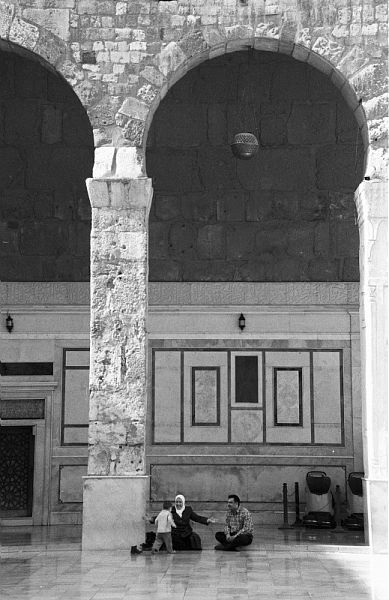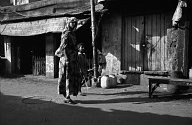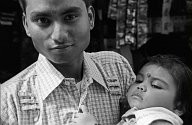Refine search
No keyword found to refine search
keywords EN
Places
Names
56 documents found
| 1 |
Documents per page :

Trip to China.
Jean-Paul Lozouet / Le Pictorium
LePictorium_0179936.jpg
Dujiangyan, Sichuan, China, Chinese child wearing international clothes, Japanese hat (piccachu), American trousers (mickey) and the bottle of water that the father carries to a French name: It's good ...

Trip to China.
Jean-Paul Lozouet / Le Pictorium
LePictorium_0179870.jpg
Panda breeding base (Daxiong-mao Fanzhi Jidi), Sichuan, Chinese tourists photographing themselves in front of an advertising statue of panda cook.
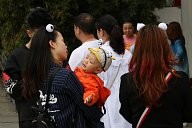
Trip to China.
Jean-Paul Lozouet / Le Pictorium
LePictorium_0179874.jpg
Panda breeding base (Daxiong-mao Fanzhi Jidi), Sichuan, Chinese tourists and their baby wearing a headband adorned with pandas.
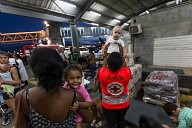
The care of Irma victims begins on the tarmac of the airport of Point-à-Pitre.
Nicolas Beaumont / Le Pictorium
LePictorium_0176764.jpg
A French Red Cross volunteer plays with a baby while waiting for the medical agreement to leave the tarmac of the airport. Management of the victims of Hurricane Irma in Guadeloupe.
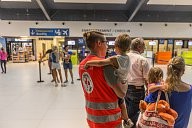
In the airport of Point-à-Pitre, volunteers of the French Red Cross take care of the victims of Irma.
Nicolas Beaumont / Le Pictorium
LePictorium_0176767.jpg
A French Red Cross volunteer carries a child to relieve his parents. Management of the victims of Hurricane Irma in Guadeloupe.
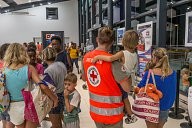
In the airport of Point-à-Pitre, volunteers of the French Red Cross take care of the victims of Irma.
Nicolas Beaumont / Le Pictorium
LePictorium_0176768.jpg
A French Red Cross volunteer carries a child to relieve his parents. Management of the victims of Hurricane Irma in Guadeloupe.
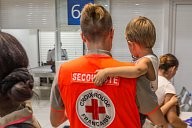
In the airport of Point-à-Pitre, volunteers of the French Red Cross take care of the victims of Irma.
Nicolas Beaumont / Le Pictorium
LePictorium_0176769.jpg
A French Red Cross volunteer carries a child to relieve his parents. Management of the victims of Hurricane Irma in Guadeloupe.
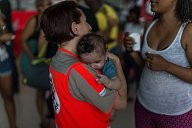
In the airport of Point-à-Pitre, volunteers of the French Red Cross take care of the victims of Irma.
Nicolas Beaumont / Le Pictorium
LePictorium_0176780.jpg
A French Red Cross volunteer carries a baby to relieve her mother. Management of the victims of Hurricane Irma in Guadeloupe.
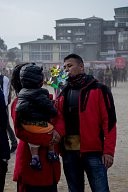
2018, Jan 15 - Maghi festival. New Year of Nepal in Tundikhel through the day. The festival had started from Kathmandu Durbar Square.
Noémie Repetto / Le Pictorium
LePictorium_0173464.jpg
Maghe Sankranti is the first day of the month of Magh of Bikram Sambat. Magh is the tenth month of the year.
Sankranti is the Sanskrit word in Eastern Astrology which refers to the transmigration of the Sun from one Rashi (sign of the zodiac) to another. In very simple, the word sankranti is the first day of the Nepali calendar. Then obviously, there are 12 sankrantis in a year. Makar Sankranti is the transition of the Sun from Dhanu rashi (Sagittarius) to Makara rashi (Capricorn).
In Hindu Astrology the sun position during the year is divided into 12 rashis (zodiac signs). It is however, very difficult to reconcile among Bikram Sambat months, Zodiac months and lunar calendar's months. While the traditional Calendar is based on lunar positions, Sankranti is a solar event. So dates of all Hindu festivals keep changing as per the Gregorian calendar and so do the Makar Sankranti too.
Makar Sankranti is the festival of the Sun God. The Sun God is the symbol of power, divinity and wisdom. The Sun God is worshiped in this festival.
Maghe Sankranti is also called Maghi. Maghi is for the New year of Tharu Community of Nepal.
Sankranti is the Sanskrit word in Eastern Astrology which refers to the transmigration of the Sun from one Rashi (sign of the zodiac) to another. In very simple, the word sankranti is the first day of the Nepali calendar. Then obviously, there are 12 sankrantis in a year. Makar Sankranti is the transition of the Sun from Dhanu rashi (Sagittarius) to Makara rashi (Capricorn).
In Hindu Astrology the sun position during the year is divided into 12 rashis (zodiac signs). It is however, very difficult to reconcile among Bikram Sambat months, Zodiac months and lunar calendar's months. While the traditional Calendar is based on lunar positions, Sankranti is a solar event. So dates of all Hindu festivals keep changing as per the Gregorian calendar and so do the Makar Sankranti too.
Makar Sankranti is the festival of the Sun God. The Sun God is the symbol of power, divinity and wisdom. The Sun God is worshiped in this festival.
Maghe Sankranti is also called Maghi. Maghi is for the New year of Tharu Community of Nepal.
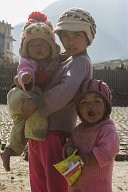
Nepal - Kathmandu Valley - Kirtipur. Handmade Bricks factory
Noémie Repetto / Le Pictorium
LePictorium_0173038.jpg
Nepal divides its citizens according to social caste. The weakest caste, called the 'untouchables', deals with the hardest and least socially rewarding jobs. The brick factory is a good example. In the Kathmandu Valley, the cities of Kirtipur and Bhaktapur are the cities where factories and factories are built.
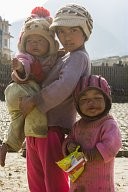
Nepal - Kathmandu Valley - Kirtipur. Handmade Bricks factory
Noémie Repetto / Le Pictorium
LePictorium_0173039.jpg
Nepal divides its citizens according to social caste. The weakest caste, called the 'untouchables', deals with the hardest and least socially rewarding jobs. The brick factory is a good example. In the Kathmandu Valley, the cities of Kirtipur and Bhaktapur are the cities where factories and factories are built.
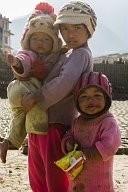
Nepal - Kathmandu Valley - Kirtipur. Handmade Bricks factory
Noémie Repetto / Le Pictorium
LePictorium_0173040.jpg
Nepal divides its citizens according to social caste. The weakest caste, called the 'untouchables', deals with the hardest and least socially rewarding jobs. The brick factory is a good example. In the Kathmandu Valley, the cities of Kirtipur and Bhaktapur are the cities where factories and factories are built.
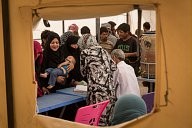
Syria: Ain Issa displaced people camp
Chris Huby / Le Pictorium
LePictorium_0165807.jpg
July 2017 - Syria - Rojava - Northern Syria - Ain Issa displaced people camp / Doctors Without Borders Clinic / Atmosphere of the waiting room.

Syria: Ain Issa displaced people camp
Chris Huby / Le Pictorium
LePictorium_0165808.jpg
July 2017 - Syria - Rojava - Northern Syria - Ain Issa displaced people camp / Doctors Without Borders Clinic / Atmosphere of the waiting room.
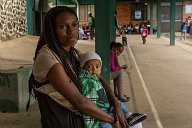
Bolivia - afrobolivianos
Chris Huby / Le Pictorium
LePictorium_0159671.jpg
February 2017 - BOLIVIA / Region of Coroico / Hospital / Jeannette came for her son to get vaccinated. The Afrobolivianos are a Black African minority living in Bolivia. They were used in the transatlantic slave trade and settled in the Yungas of the department of La Paz, where they cultivate coca.
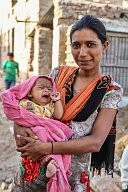
Portraits of women and children of Rajasthan. In the countryside, the women of Rajasthan wear long skirts, a small bolero and veil with bright colors. They adorn themselves with silver jewels ( earrings, nose rings, necklaces, arm and ankle bracelets). They raise the children and participate in the rural works ( cattle, farming, wood and water tasks). Most of the marriages are settled and the place of women is by and at the service of their in-laws.
Sandrine Huet / Le Pictorium
LePictorium_0146600.jpg
Pictures of Rajasthan, portraits and lifestyles
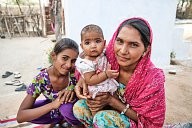
Portraits of women and children of Rajasthan. In the countryside, the women of Rajasthan wear long skirts, a small bolero and veil with bright colors. They adorn themselves with silver jewels ( earrings, nose rings, necklaces, arm and ankle bracelets). They raise the children and participate in the rural works ( cattle, farming, wood and water tasks). Most of the marriages are settled and the place of women is by and at the service of their in-laws.
Sandrine Huet / Le Pictorium
LePictorium_0146601.jpg
Pictures of Rajasthan, portraits and lifestyles
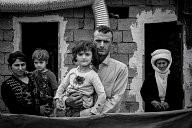
Yazidis families flee ISIS and settled in Christian neighborhood of Ancawa in Erbil
Alexandre Afonso / Le Pictorium
LePictorium_0144157.jpg
family portrait
After the attack of ISIS in Sinjar many Yazidis families flee and settled in Christian neighborhood of Ancawa in Erbil. the families who had no conditions to rent a house, occupied abandoned constructions. as is the case of these families.
After the attack of ISIS in Sinjar many Yazidis families flee and settled in Christian neighborhood of Ancawa in Erbil. the families who had no conditions to rent a house, occupied abandoned constructions. as is the case of these families.
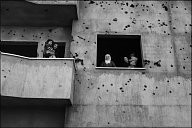
Diyarbakir in Turkish Kurdistan
Alexandre Afonso / Le Pictorium
LePictorium_0133595.jpg
Turkey is witnessing the largest Kurdish uprising over the past 200 years. Violent suppression of the rebellions’ actions by the Turkish police already caused more than 150 casualties among civilians, and serious infrastructure damage in the Kurdish region.
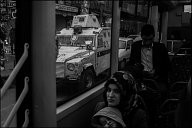
Diyarbakir in Turkish Kurdistan
Alexandre Afonso / Le Pictorium
LePictorium_0133587.jpg
Turkey is witnessing the largest Kurdish uprising over the past 200 years. Violent suppression of the rebellions’ actions by the Turkish police already caused more than 150 casualties among civilians, and serious infrastructure damage in the Kurdish region.
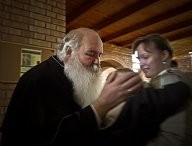
Portrait of Reverend Gábor Iványi, The Hungarian Martin Luther King
Sylvain Leser / Le Pictorium
LePictorium_0120789.jpg
Portrait of Reverend Gábor Iványi, The Hungarian Martin Luther King -
Portrait of Reverend Gábor Iványi, The Hungarian Martin Luther King -
Meet the Reverend Gábor Iványi home, - on the outskirts of Budapest in the Evangelical church of which he is the shepherd. - After the mass. - - Gábor Iványi’s words - - In the 1970’s the Hungarian Methodist Church split in 2 parts: for political reasons a group of people (and 12 pastors) were excluded of the church. This group, after 7 and ½ years of illegality was recognized as Hungarian Evangelical Fellowship (us). - Because of that (while being chased from our houses, taken before the court, etc.) in the 70’s-80’s for 4 and 1/2 years we had church services ont he street, my children had Sunday school in a park in the neighborhood. - Now, the Methodist Church was recognized again, plus they got a certification of an International Methodist Organization that we are not real Methodists. Although our doctrines are the same. Buti t is true that we are not subjugate to any organization like that and were always free to have a dialogue e.g. with our Jewish brothers. (Our sins towards Jewish people – contrary to France and Germany – were never repented.) - Political elit is embarrassed and disturbed by the topics we are interested in: the poor, needy, homeless, Jews, Gipsies, etc. We always fighted for them under every government. - Since the 70’s (when it was still illegal) we have been working with the poor all over the country. - In 1981 finally our church was recognized by the state. - Since 1989 we do our social work legally through Oltalom Charity Society as well. - In 1987 we formed John Wesley Theological College – as our people were not welcome at other theologies – and when it was officially registered in 1991 we already had a class finishing. - Since 1993 we have secular education as well for 1000-1500 students: Social Work, Pedagogy, Environmental Safety. - We have never asked to be supported as a church, but our (educational/social) work to be supported. - Loosing our status as a church means that we will get 50% less money which means that our work will slowly be destroyed down ad impossible to continue. - Until now we got 50% of the state in our budget, the other 50% through applications and the extra subsidee for churches. - It is clear that we couldn’t keep our status as a church for political reasons. All the conditions and decisions are very subjectiv. - - We have negativ experiences with most of the churches: the rcognized ones don’t say anything for the others, they are happy to be in and they don’t risk. - The excluded ones keep silence and hope that one day they will also be recognized. They don’t have unity to work or to protest together. It seems that we (Hungarian Evangelical Fellowship/Église Évangelique des Freres en Hongrie) are quite lonely in this battle, we can count on God. And there are (religious and non-religious people) who encourage us not to give up. - - The Reformed and the Catholic Church took over lots of schools. We don’t agree with that. When we take over schools, it is for people who don’t have another chance, to help them, but not to make them members of our church. - - We will fight (already did) for our right sin Hungary, but also plan to turn to the European Court. But even in case we win, it takes 1,5-2 years. And we need to survive somehow. At the moment the state is our debtor with several million HUF. - Message to Europe: it’s unbelievable that in the heart of Europe, in the 21st century such a discriminative situation can exist, like between the 2 world wars. Our leaders are pointing at other countries and they take over all the bad from Europe, refusing the good ones. - Hungary had an very good curch law until now that could have been examplery for other countries. - In the middle of the 90’s I baptized the 2 first children of Viktor Orban, but than he changed, they took them to another church and the others were baptized Reformed and Catholic. - At the moment we have 600 beds for homeless, and every day we take care of 1,000 homeless. - In our elderly homes there are 200 people. We help about 1,000 families all over the country. We have more than 20 institutions from kindergarten to highschool for more than 3,000 children. Over 90% of them are deeply disadvantaged. There is a kindergarten for 40 children of homeless parents. - The 2/3 majority of the Parliament (FIDESZ-KDNP) make changes of laws we never seen. They don’t communicate, they try to strengthen their power. - They offend education and churches with their anti-constitutional acts and laws
Portrait of Reverend Gábor Iványi, The Hungarian Martin Luther King -
Meet the Reverend Gábor Iványi home, - on the outskirts of Budapest in the Evangelical church of which he is the shepherd. - After the mass. - - Gábor Iványi’s words - - In the 1970’s the Hungarian Methodist Church split in 2 parts: for political reasons a group of people (and 12 pastors) were excluded of the church. This group, after 7 and ½ years of illegality was recognized as Hungarian Evangelical Fellowship (us). - Because of that (while being chased from our houses, taken before the court, etc.) in the 70’s-80’s for 4 and 1/2 years we had church services ont he street, my children had Sunday school in a park in the neighborhood. - Now, the Methodist Church was recognized again, plus they got a certification of an International Methodist Organization that we are not real Methodists. Although our doctrines are the same. Buti t is true that we are not subjugate to any organization like that and were always free to have a dialogue e.g. with our Jewish brothers. (Our sins towards Jewish people – contrary to France and Germany – were never repented.) - Political elit is embarrassed and disturbed by the topics we are interested in: the poor, needy, homeless, Jews, Gipsies, etc. We always fighted for them under every government. - Since the 70’s (when it was still illegal) we have been working with the poor all over the country. - In 1981 finally our church was recognized by the state. - Since 1989 we do our social work legally through Oltalom Charity Society as well. - In 1987 we formed John Wesley Theological College – as our people were not welcome at other theologies – and when it was officially registered in 1991 we already had a class finishing. - Since 1993 we have secular education as well for 1000-1500 students: Social Work, Pedagogy, Environmental Safety. - We have never asked to be supported as a church, but our (educational/social) work to be supported. - Loosing our status as a church means that we will get 50% less money which means that our work will slowly be destroyed down ad impossible to continue. - Until now we got 50% of the state in our budget, the other 50% through applications and the extra subsidee for churches. - It is clear that we couldn’t keep our status as a church for political reasons. All the conditions and decisions are very subjectiv. - - We have negativ experiences with most of the churches: the rcognized ones don’t say anything for the others, they are happy to be in and they don’t risk. - The excluded ones keep silence and hope that one day they will also be recognized. They don’t have unity to work or to protest together. It seems that we (Hungarian Evangelical Fellowship/Église Évangelique des Freres en Hongrie) are quite lonely in this battle, we can count on God. And there are (religious and non-religious people) who encourage us not to give up. - - The Reformed and the Catholic Church took over lots of schools. We don’t agree with that. When we take over schools, it is for people who don’t have another chance, to help them, but not to make them members of our church. - - We will fight (already did) for our right sin Hungary, but also plan to turn to the European Court. But even in case we win, it takes 1,5-2 years. And we need to survive somehow. At the moment the state is our debtor with several million HUF. - Message to Europe: it’s unbelievable that in the heart of Europe, in the 21st century such a discriminative situation can exist, like between the 2 world wars. Our leaders are pointing at other countries and they take over all the bad from Europe, refusing the good ones. - Hungary had an very good curch law until now that could have been examplery for other countries. - In the middle of the 90’s I baptized the 2 first children of Viktor Orban, but than he changed, they took them to another church and the others were baptized Reformed and Catholic. - At the moment we have 600 beds for homeless, and every day we take care of 1,000 homeless. - In our elderly homes there are 200 people. We help about 1,000 families all over the country. We have more than 20 institutions from kindergarten to highschool for more than 3,000 children. Over 90% of them are deeply disadvantaged. There is a kindergarten for 40 children of homeless parents. - The 2/3 majority of the Parliament (FIDESZ-KDNP) make changes of laws we never seen. They don’t communicate, they try to strengthen their power. - They offend education and churches with their anti-constitutional acts and laws

Life in India: Kolkata.
Sylvain Leser / Le Pictorium
LePictorium_0121911.jpg
Life in India: Kolkata.
-
Curiosity, anger and hope for these - Streets children of Kolkata.
-
Curiosity, anger and hope for these - Streets children of Kolkata.
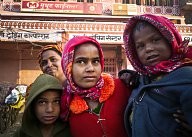
Jaipur the Pink City of Rajasthan
Indian Glance
Indian Glance
Sylvain Leser / Le Pictorium
LePictorium_0121937.jpg
Jaipur Pink City
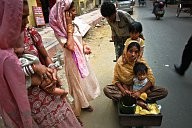
New Delhi
Indian Glance
Indian Glance
Sylvain Leser / Le Pictorium
LePictorium_0116313.jpg
Street scene in New Delhi
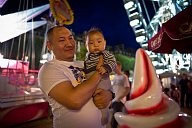
Funfair at the Tuileries garden.
Sylvain Leser / Le Pictorium
LePictorium_0116379.jpg
Funfair at the Tuileries garden. -
Scene of Saturday evening in the fun fair
In a place steeped in history of France, every summer the Garden of the Tuileries welcomes about sixty fairground attractions for the enjoyment and the pleasure of the children and the parents.
For several years the fun fair of the Garden of the Tuileries takes place lasting of summery period July-August
Scene of Saturday evening in the fun fair
In a place steeped in history of France, every summer the Garden of the Tuileries welcomes about sixty fairground attractions for the enjoyment and the pleasure of the children and the parents.
For several years the fun fair of the Garden of the Tuileries takes place lasting of summery period July-August

Life in India : Mumbai.
Sylvain Leser / Le Pictorium
LePictorium_0119053.jpg
Life in India : Mumbai. -
"Rice and milk" - Touching and "untouchable" kids. Colaba.
"Rice and milk" - Touching and "untouchable" kids. Colaba.
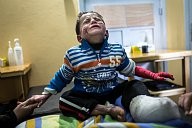
Gaza: fuel shortage and gas accidents
Chris Huby / Le Pictorium
LePictorium_0095663.jpg
A boy suffering third-degree burns following a butane bottle explosion cries while at the MSF clinic in Gaza City.
For months, the gas has replaced gasoline across Gaza , creating dramatic household accidents.
For months, the gas has replaced gasoline across Gaza , creating dramatic household accidents.

Gaza: fuel shortage and gas accidents
Chris Huby / Le Pictorium
LePictorium_0095661.jpg
A mother holds her daughter suffering third-degree burns following a butane bottle explosion cries while at the MSF clinic in Gaza City.
For months, the gas has replaced gasoline across Gaza , creating dramatic household accidents.
For months, the gas has replaced gasoline across Gaza , creating dramatic household accidents.
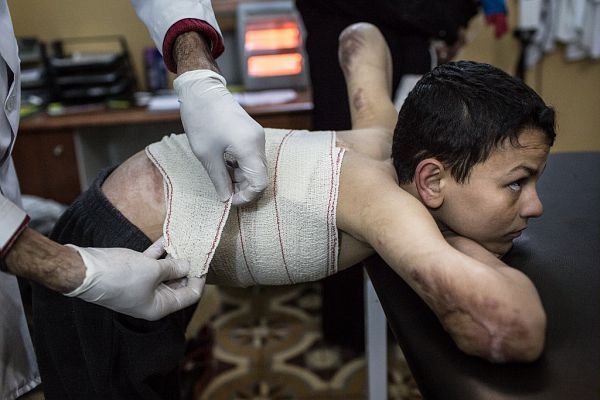
Gaza: fuel shortage and gas accidents
Chris Huby / Le Pictorium
LePictorium_0095666.jpg
Bandages are applied on the body of a boy suffering third-degree burns following a butane bottle explosion at the MSF clinic in Gaza City.
For months, the gas has replaced gasoline across Gaza , creating dramatic household accidents.
For months, the gas has replaced gasoline across Gaza , creating dramatic household accidents.
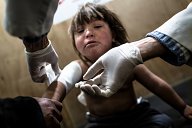
Gaza: fuel shortage and gas accidents
Chris Huby / Le Pictorium
LePictorium_0095669.jpg
A child suffering third-degree burns following a butane bottle explosion is treated at the MSF clinic in Gaza City.
For months, the gas has replaced gasoline across Gaza , creating dramatic household accidents.
For months, the gas has replaced gasoline across Gaza , creating dramatic household accidents.
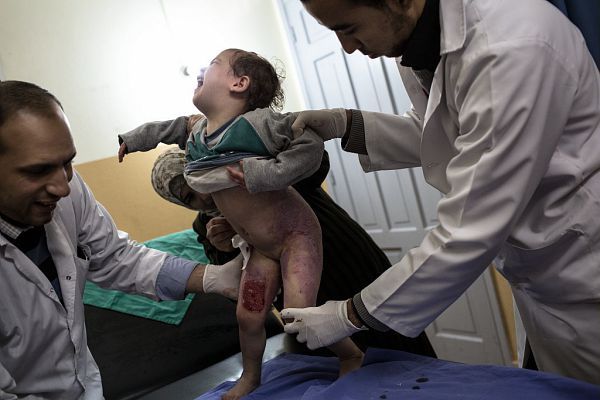
Gaza: fuel shortage and gas accidents
Chris Huby / Le Pictorium
LePictorium_0095672.jpg
Doctors take car of a young boy suffering third-degree burns following a butane bottle explosion cries while at the MSF clinic in Gaza City.
For months, the gas has replaced gasoline across Gaza , creating dramatic household accidents.
For months, the gas has replaced gasoline across Gaza , creating dramatic household accidents.
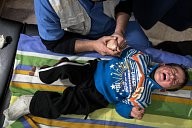
Gaza - The Domino Effect. From Egyptian geopolitical change to domestic accidents.
Chris Huby / Le Pictorium
LePictorium_0095662.jpg
A child suffered third-degree burns following a gas accident. For months, gas has replaced gasoline throughout Gaza, leading to dramatic domestic accidents.

Gaza: fuel shortage and gas accidents
Chris Huby / Le Pictorium
LePictorium_0095678.jpg
A boy suffering third-degree burns following a butane bottle explosion during treatment at the MSF clinic in Gaza City.
For months, the gas has replaced gasoline across Gaza , creating dramatic household accidents.
For months, the gas has replaced gasoline across Gaza , creating dramatic household accidents.
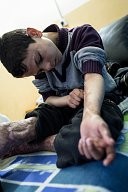
Gaza - The Domino Effect. From Egyptian geopolitical change to domestic accidents.
Chris Huby / Le Pictorium
LePictorium_0095664.jpg
A child suffered third-degree burns following a gas accident. For months, gas has replaced gasoline throughout Gaza, leading to dramatic domestic accidents.
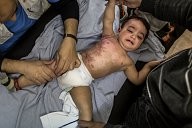
Gaza - The Domino Effect. From Egyptian geopolitical change to domestic accidents.
Chris Huby / Le Pictorium
LePictorium_0095665.jpg
A child suffered third-degree burns following a gas accident. For months, gas has replaced gasoline throughout Gaza, leading to dramatic domestic accidents.

Gaza: fuel shortage and gas accidents
Chris Huby / Le Pictorium
LePictorium_0095679.jpg
A boy suffering third-degree burns following a butane bottle explosion is treated by doctors at the MSF clinic in Gaza City.
For months, the gas has replaced gasoline across Gaza , creating dramatic household accidents.
For months, the gas has replaced gasoline across Gaza , creating dramatic household accidents.
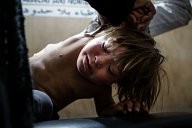
Gaza - The Domino Effect. From Egyptian geopolitical change to domestic accidents.
Chris Huby / Le Pictorium
LePictorium_0095667.jpg
A child suffered third-degree burns following a gas accident. For months, gas has replaced gasoline throughout Gaza, leading to dramatic domestic accidents.
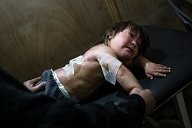
Gaza - The Domino Effect. From Egyptian geopolitical change to domestic accidents.
Chris Huby / Le Pictorium
LePictorium_0095668.jpg
A child suffered third-degree burns following a gas accident. For months, gas has replaced gasoline throughout Gaza, leading to dramatic domestic accidents.
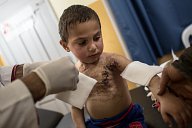
Gaza: fuel shortage and gas accidents
Chris Huby / Le Pictorium
LePictorium_0095680.jpg
A boy suffering third-degree burns following a butane bottle explosion is treated at the MSF clinic in Gaza City.
For months, the gas has replaced gasoline across Gaza , creating dramatic household accidents.
For months, the gas has replaced gasoline across Gaza , creating dramatic household accidents.
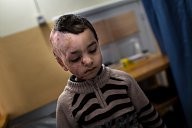
Gaza - The Domino Effect. From Egyptian geopolitical change to domestic accidents.
Chris Huby / Le Pictorium
LePictorium_0095670.jpg
A child suffered third-degree burns following a gas accident. For months, gas has replaced gasoline throughout Gaza, leading to dramatic domestic accidents.

Gaza - The Domino Effect. From Egyptian geopolitical change to domestic accidents.
Chris Huby / Le Pictorium
LePictorium_0095671.jpg
A child suffered third-degree burns following a gas accident. For months, gas has replaced gasoline throughout Gaza, leading to dramatic domestic accidents.
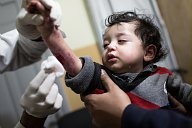
Gaza - The Domino Effect. From Egyptian geopolitical change to domestic accidents.
Chris Huby / Le Pictorium
LePictorium_0095673.jpg
A child suffered third-degree burns following a gas accident. For months, gas has replaced gasoline throughout Gaza, leading to dramatic domestic accidents.

Gaza - The Domino Effect. From Egyptian geopolitical change to domestic accidents.
Chris Huby / Le Pictorium
LePictorium_0095674.jpg
A child suffered third-degree burns following a gas accident. For months, gas has replaced gasoline throughout Gaza, leading to dramatic domestic accidents.
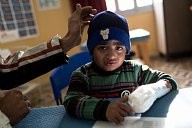
Gaza - The Domino Effect. From Egyptian geopolitical change to domestic accidents.
Chris Huby / Le Pictorium
LePictorium_0095675.jpg
A child suffered third-degree burns following a gas accident. For months, gas has replaced gasoline throughout Gaza, leading to dramatic domestic accidents.
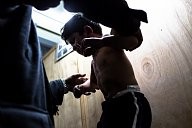
Gaza - The Domino Effect. From Egyptian geopolitical change to domestic accidents.
Chris Huby / Le Pictorium
LePictorium_0095676.jpg
A child suffered third-degree burns following a gas accident. For months, gas has replaced gasoline throughout Gaza, leading to dramatic domestic accidents.
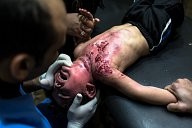
Gaza - The Domino Effect. From Egyptian geopolitical change to domestic accidents.
Chris Huby / Le Pictorium
LePictorium_0095677.jpg
A child suffered third-degree burns following a gas accident. For months, gas has replaced gasoline throughout Gaza, leading to dramatic domestic accidents.
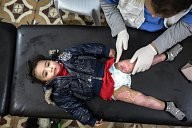
Gaza - The Domino Effect. From Egyptian geopolitical change to domestic accidents.
Chris Huby / Le Pictorium
LePictorium_0095681.jpg
A child suffered third-degree burns following a gas accident. For months, gas has replaced gasoline throughout Gaza, leading to dramatic domestic accidents.
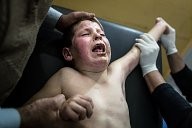
Gaza - The Domino Effect. From Egyptian geopolitical change to domestic accidents.
Chris Huby / Le Pictorium
LePictorium_0095682.jpg
A child suffered third-degree burns following a gas accident. For months, gas has replaced gasoline throughout Gaza, leading to dramatic domestic accidents.
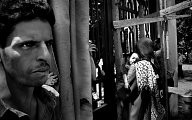
Egypt: the struggle of the Muslim Brotherhood.
Stefania Mizara / Le Pictorium
LePictorium_0072138.jpg
Pro Morsi supporters seek protection inside the mosque that was used as a makeshift hospital during the night of the 8th massacre near the Republican guard, while others from outside ask informations for missing relatives. 41 Egyptians were killed and more than 300 others are wounded in fire opened on pro-Morsi protesters during the clash between Egyptian security forces and supporters of Morsi in front of Republican Guard headquarters in Cairo, Egypt, on July 08, 2013.
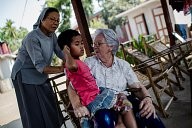
Sister Mary
Chris Huby / Le Pictorium
LePictorium_0069273.jpg
Sister Mary, right, and Sister Benedicte welcome a 7-year-old girl infected with HIV who lost her two parents killed by the virus. Sister Mary runs the Hope Center, a social and medical center financially supported by the Catholic Church and that shelters victims of HIV, in the poor region of Myitkyina, in the Kachin territory, northern Burma.
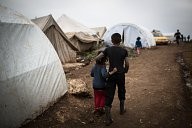
Syria refugee camps in Bal al-Hawa and Atme
Chris Huby / Le Pictorium
LePictorium_0068368.jpg
Two kids walk by the tens odf the Atme refugee camp. The girl is right-foot handicaped after being infected and not treated. Atme's camp welcomes more than 10 000 refugees.
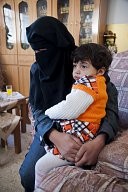
Palestinian villages under repression.
Chris Huby / Le Pictorium
LePictorium_0052286.jpg
A mother and her daughter, who lived violences in their village of Awarta. The settlers came into her house and terrorised all the family.
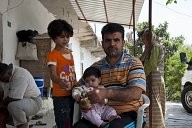
A refugee with his family.
Chris Huby / Le Pictorium
LePictorium_0052040.jpg
A refugee with his family.

